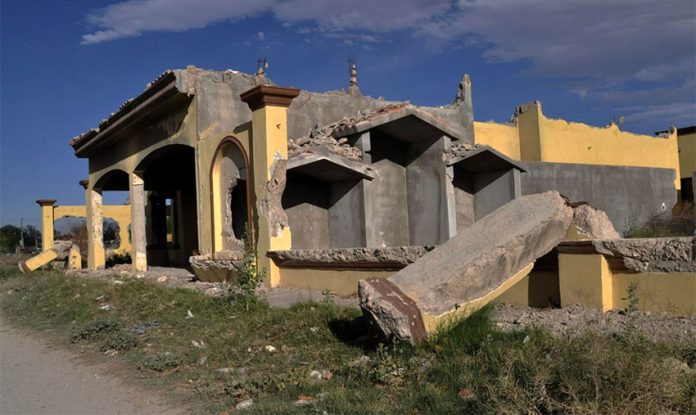This story was originally published by ProPublica.
Netflix will release a series next month inspired by a story that revealed the U.S. Drug Enforcement Administration’s role in setting off a massacre in northern Mexico in 2011, leaving dozens of people dead or missing.
“How the U.S. Triggered a Massacre in Mexico” was published in 2017 by the investigative news agency ProPublica.
The series, called Somos., which means “we are,” was created by award-winning screenwriter and producer James Schamus, who assembled an almost entirely Mexican crew of writers, researchers, cinematographers, editors, actors and extras. It was written and filmed in Spanish, on sets located primarily in the Mexican state of Durango, not far from Allende, in the neighboring state of Coahuila, which was the scene of the tragic events on which the series is based.
Schamus, an Oscar nominee and former CEO of Focus Features who previously produced widely acclaimed films including Crouching Tiger, Hidden Dragon, Brokeback Mountain, and Lust, Caution, said that after reading ProPublica’s reporting on Allende he was struck by the complex story behind what had happened there and the fact that the tragedy was not more widely known, largely because systemic impunity made it dangerous for those affected to speak out about it.
He said he immediately started reflecting on ways the story could be told through a fictional narrative that centered on the experiences of the victims — and could potentially reach a wider audience. The period at the end is meant to make the title more of a universal assertion that means, “This is us.”
Somos. will give a third life to ProPublica’s “How the United States Triggered a Massacre in Mexico.” The online story, which was co-published with National Geographic, was an oral history that reconstructed a 2010 DEA case that had targeted the leaders of a vicious Mexican drug cartel.
The operation erupted in violence when it was compromised by corrupt members of a DEA-trained Mexican police unit. The story relied heavily on testimonies from people responsible for the attack and those who were its victims, including law enforcement agents, cartel members, local officials and relatives of the dead and missing.
After the story was published, Audible used some of the recorded testimonies to produce a podcast featuring well-known film actors, including Cheech Marin and Danny Trejo.
It was important to Schamus that Somos. be both authentic and unconventional. Because he’d never worked in Mexico and didn’t speak Spanish, he knew he’d need to rely heavily on a team of Mexican artists to achieve his vision. Among those he enlisted as writers were Monika Revilla and Fernanda Melchor, whose earlier work had also grappled with humanity’s darker side.
They and others on the team immersed themselves for three years in the history, lives, culture and language of the northern region of the country, which has been shaped, for better and worse, by its proximity to the United States.
The pandemic and other security concerns prevented the crew from traveling to Allende, but they used Google maps, Instagram and Facebook to get to know its streets and people. Melchor said that it was by watching social media accounts of Allende’s youth football team that they learned some of the players were girls, which inspired them to create such a character in the series. Before long, Revilla said, “We knew the names of the most popular bars in town and what nights they had karaoke.”
The team also set out to make Somos. different from so many other television series about drug violence, which tend to focus on law enforcement agents and traffickers. “Instead of the narco or the cop with the gun,” Schamus said, “we turn the camera around on the extra in the corner. The people who hover around the borders of the screen, those are the people at the center of Somos.”
Revilla, whose previous work includes the popular Netflix series La Casa de las Flores (The House of Flowers), said, “As someone with a background in television, I’ve seen series after series that glamorize the traffickers, and that tell what it’s like to live in the midst of a war against drugs, but not from a point of view that has anything to do with us.”
Melchor, who is best known for her highly regarded novel Temporada de Huracanes (Hurricane Season), said that turning real people who’d suffered unspeakable atrocities into television characters without trivializing or retraumatizing them was perhaps the crew’s toughest challenge. She said that she, Schamus and Revilla wanted their characters’ stories to be realistic, but not real, out of respect for the massacre’s victims and their relatives. “We didn’t want those people to feel aggrieved,” Melchor said, “but at the same time we wanted them to feel their experiences were represented.”
Somos. stars a large collection of professional and amateur actors. One young man, Jesús Sida, who plays a central character named Paquito, was discovered working after school as a mechanic in his father’s garage.
The series is scheduled for worldwide release on June 30. Melchor said she hopes it will “start a conversation, not only about Allende, but about all the Allendes that there have been in other parts of Mexico, and the massacres that continue everywhere.”
Schamus, who has learned a considerable amount of Spanish in the last three years, said he had similar hopes for the series, but that they can only happen if viewers like it. He said that the early response has been glowing.
“I think the series could have the chance to shift discourse in Mexico and elsewhere about what has been the structural impact of the violence of the drug war,” he said. “But the reason it has any chance of having that impact is because the work by this team is awesome.”
Mexico News Daily
